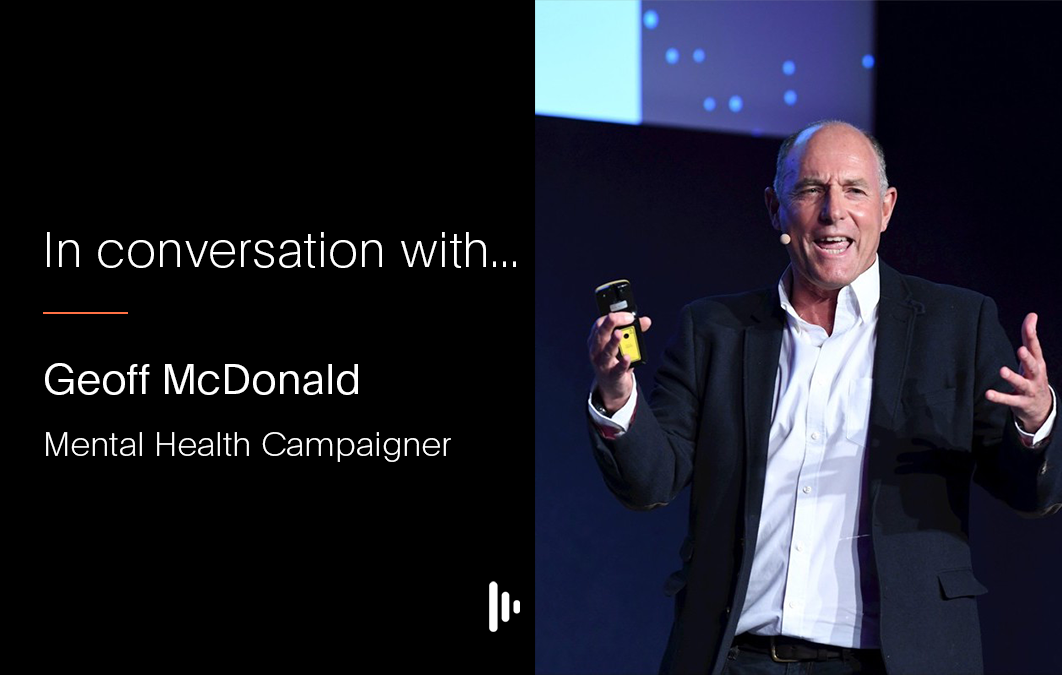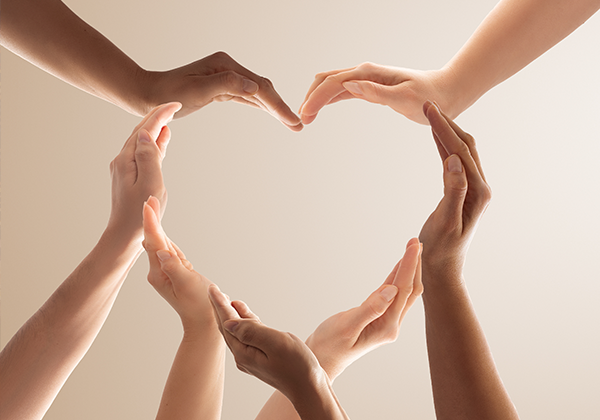
blog 2022 8 min read
In conversation with Mental Health Campaigner Geoff McDonald

Mental Health is always a priority at disguise and World Mental Health Day is a great opportunity to open the conversation and get talking. We spoke with Keynote Speaker, Consultant and Mental Health Campaigner Geoff McDonald about his career, mental health and how we can improve well-being in the workplace.
What has been your career journey so far?
I spent over 24 years in human resources at Unilever, culminating in fulfilling the role of Global VP HR for our marketing communications and sustainability functions. Mid 2014 I left Unilever to campaign for mental health. Today, I work with organisations to address stigma related to mental illness to elevate employee health and make it a strategic priority, embedding purpose as a driver of business performance.
What inspired you to start advocating for mental health?
It was more of a tragic inspiration: the loss of a friend of mine. I had also struggled with mental ill health as well. When he passed I realised that the difference between him and me is that I had been able to talk to people. That occurrence catalysed me into beginning a journey with a deep sense of purpose, i.e. to create a workplace where every individual feels they genuinely have the choice to ask for help if they are struggling with a common form of mental ill health.
Just one conversation could have saved my friend's life. There are billions that are currently struggling. I want to give them a chance to have that conversation. That is worth fighting for.
Can you tell us about your own mental health journey?
Back in 2008, I was diagnosed with anxiety-fueled depression. The only reason I’m still alive is that, when I was diagnosed, I asked for help. I was not burdened by stigma. I was able to have conversations with my wife, friends and colleagues. And those conversations resulted in me experiencing a sense of love and hope.
I felt loved because of the conversations I had. I had hope as people who had gone through the same had recovered.
My advice to anybody who may be struggling is to ask for help. As artist Charles Mackesy says, “asking for help is not giving up, it's refusing to give up." Have those conversations. Go see a doctor. Recovery in some form is possible. How you are feeling right now will pass. There is nothing wrong with you. Something has happened to you. It’s the same as having a physical ailment. Do not be burdened by the stigma.
What does World Mental Health Day mean to you?
World Mental Health day is all about raising awareness and enhancing understanding. The more we raise awareness and enhance issues, the easier it is for us to be empathetic.
John F Kennedy started a conversation about putting a man on the moon and bringing him back safely and it happened. If we can have days like World Mental Health Day where these conversations are taking place in workplaces, we can begin to create truly inclusive workplaces, where people feel that they genuinely have the choice to put their hand up and ask for some help, if they are struggling mentally or emotionally. And ultimately, by doing that, you might just save a life."
Geoff McDonald, Mental Health Campaigner
Why do you think mental health matters in the workplace?
Mental health, in the first place refers to our cognitive abilities, which is, essentially, our ability to think clearly. At work, we want our cognitive abilities to be sound and working at their best. When people’s cognitive abilities are stimulated, they perform better in the tasks they are doing. Also, when people develop mental ill health, their enthusiasm and productivity drop.
We also want to create a place where people feel comfortable talking about mental ill health so we can prevent things like suicide. Depression is a very common illness that affects most people at some point in their lives. When we create a culture of care and concern, we create an attractive place to work. Mental health and emotional health truly matter everywhere, including in the workplace.
What is the state of mental health at work at the moment?
Latest estimates from UK government research state that 1 in 6 adults experienced a ‘common mental disorder’ such as depression or anxiety in the past week. I do believe, however, in spite of any statistic, that we all have weeks where we feel more sad than we usually do. We all suffer from mental ill health, it's just that some people suffer more permanently than others.
In the UK, particularly, there is a lot of stress for individuals right now. We have come from two years of living in a pandemic. We are now in a cost of living crisis where companies are cutting costs. This leaves a strain on employees which increases the risk of mental ill health.
It is now more important than ever that we, as organisations, send that message and run those campaigns.
It’s ok to not be ok.
In the UK, businesses have made reasonable progress in the past five years, but there is a long way to go. Leaders think they have created a safe space to talk but many people further down the ladder may not feel as safe as leaders think they do. We are at base camp in Everest and the tent is flapping in the wind.
Do you think that the workplace has an impact on people’s mental health?
I believe that both individuals and organisations need to take accountability for mental ill health.
Organisations need to consider a number of factors that will impact on the mental health of their people, namely leadership behaviours, policies, systems and processes, ways of working, quality of relationships, sense of purpose and meaning, adequate rewards, workload, job security, etc. If a flower doesn’t bloom, it’s not the flower, it’s the environment that's the problem. The same goes for the workplace.
I also believe that individuals have to take accountability to protect their mental health as well. Practising self-care and having a sense of purpose is really important. It builds a protective arm as you go into a stressful environment.
What do you find helpful for improving mental health?
Create a mindset where you say the most important priority is my health. If you don’t make time for your wellness, you might be forced to make even more time for illness.
We could all take 40 minutes every single day to improve our health. I have an acronym for it. It’s called CAN DO
C is for connection. Take five minutes to connect with nature, a friend or a family member. This is good for your emotional health.
A is for being active and exercising in whichever way we feel works best for us. This is good for your physical health.
N is for making time to be nice to someone. It makes you feel good in turn. This is good for developing a sense of purpose.
D is for discovering and being curious. It’s good for our cognitive abilities. This is good for “oiling” the neural pathways and your mental health.
O is for observation or recovery. Every two hours, take a five-minute break and just be. This is to recover and destress.
These small things, over time, make a big difference.
Any advice for those who know somebody who is struggling? How can you support them?
It’s a hard one. We have never taught people how to care for people who may be struggling menatlly or emotionally. The two most important ingredients are love and hope. If you can, find a way to make that person feel truly loved. Find a way to listen. Be there to love, be there to offer some hope. You can’t take accountability for how they are feeling but you can be there for them.
The best thing you can do is be an active listener. We can’t always be happy or content, but we can always appreciate someone who can listen. Also, point them in the direction of other people who can listen as well. My TEDx Talk covers this in more detail.
How can we keep mental health front of mind for more than just one day a year?
We have to integrate mental health into the concept of well-being and make employee health a strategic priority. This means we invest the right amount of resources. As we invest, we celebrate milestones and we shift the culture of the organisation. This is not about a day where we focus on mental health, or a well-being week. This is about truly transforming the culture of an organisation such that every life is enhanced.
Wellness at disguise
disguise drives a “wellness first” initiative with a holistic approach and a number of initiatives in place to support employee mental health including mental health buddies, helplines and objectives for monitoring and supporting mental health across teams.

